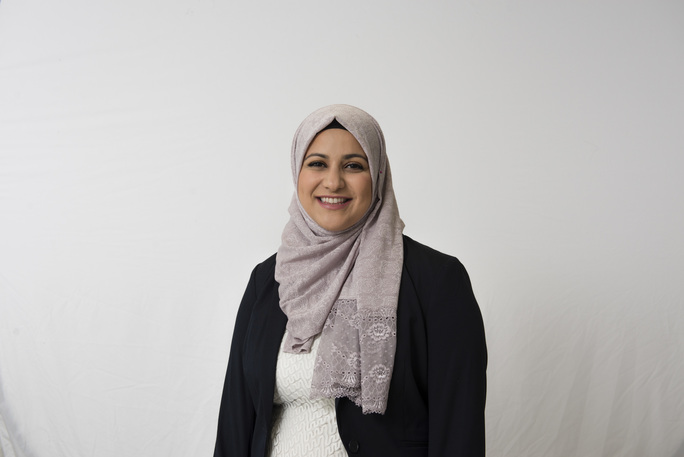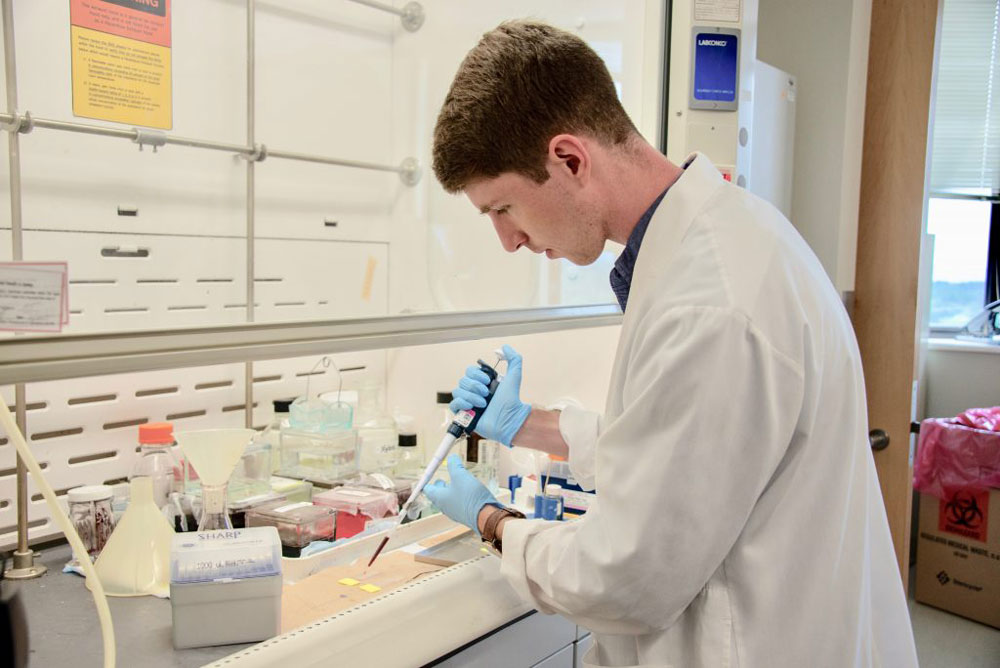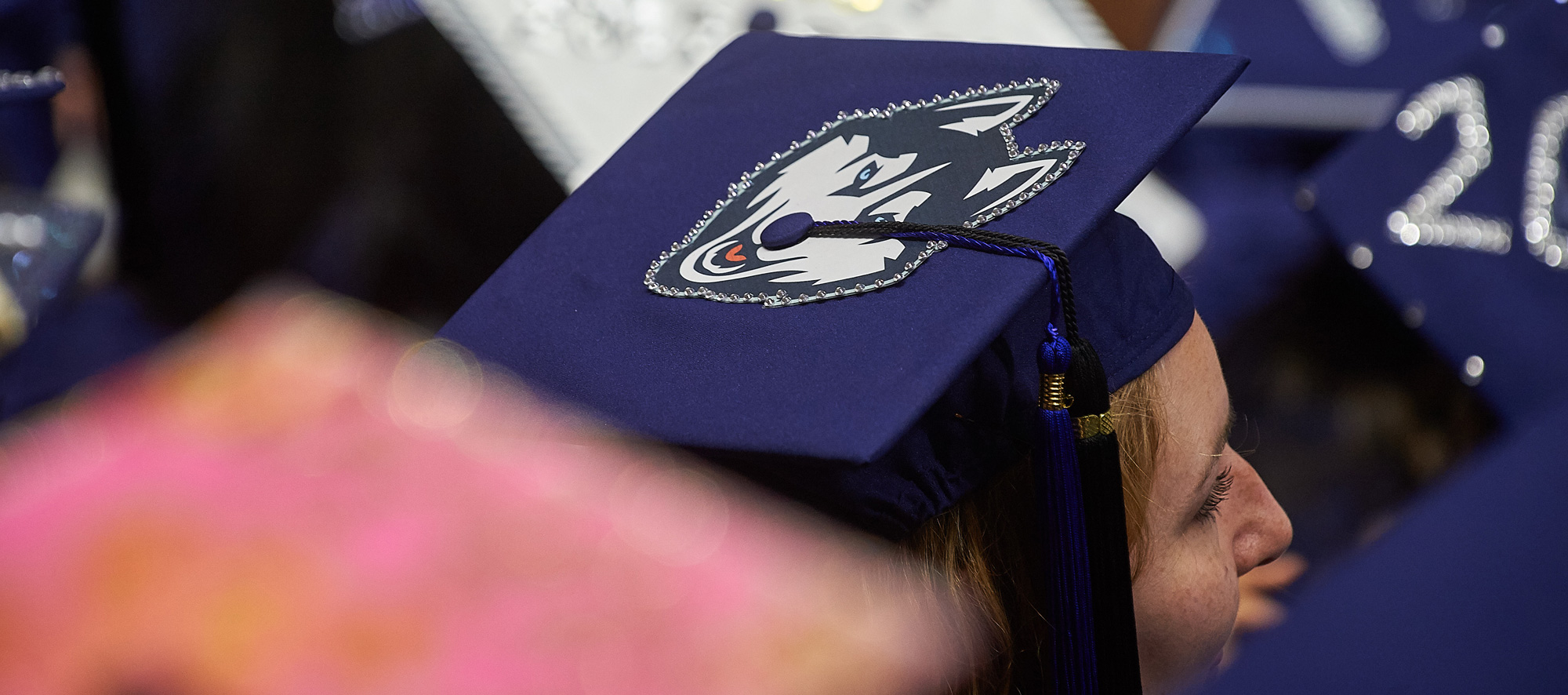
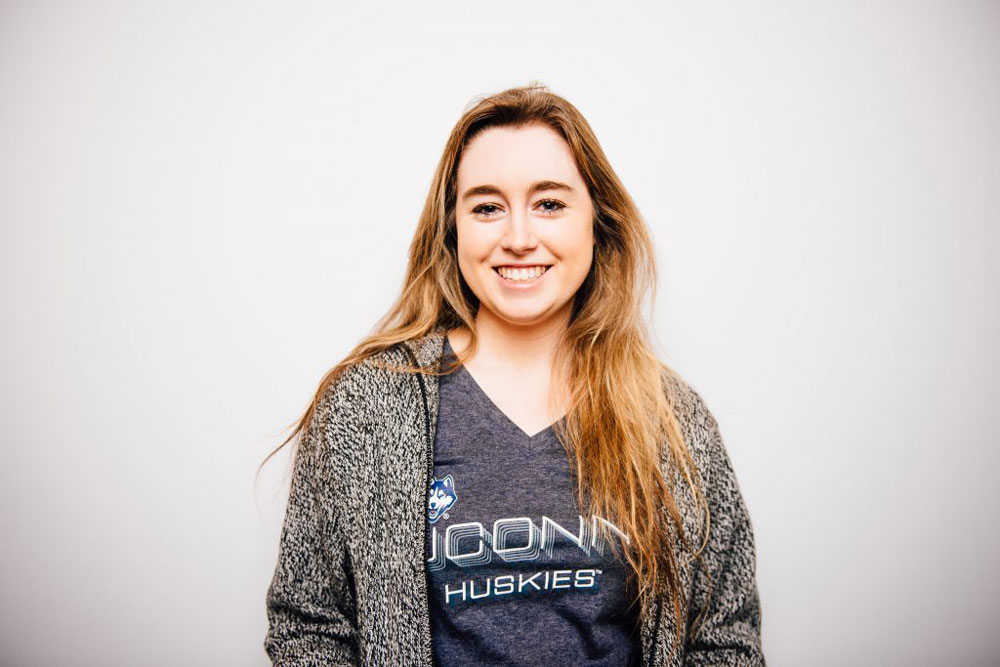
Hannah Bonitz
- Major:Management Information Systems, with a minor in Women's, Gender, and Sexuality Studies
- School of Business and College of Liberal Arts and Sciences
- Extracurriculars: Group and Organization Management academic journal, social media coordinator; OPIM Innovate, emerging technologies lab specialist; History Department, independent research assistant; Omicron Pi Sorority, vice president; 2018 Panhellenic Recruitment Management Team, counselor; Information Management Association, member; Honors Program; Beta Gamma Sigma; UConn School of Business Hall of Fame, student inductee (2019)
- Scholarship: UConn's Academic Excellence Scholarship
- Hometown: Cheshire, Connecticut
Why did you choose your area of study?
I knew from the beginning I wanted exposure to the evolving and innovative field of information technology (IT). That being said, I never expected I would grow so passionate about the intersection of technology and business – and specifically leveraging technology through business initiatives to promote social good. I grew intrigued by project management, business analytics, and opportunities to utilize corporate citizenship to make a difference in this world. This led me to pursue a women's, gender, and sexuality studies minor, and my coursework in this domain provided me with newfound, fascinating ways of thinking and a deeper understanding of societal trends.
Who is your favorite professor and why?
I have had a number of fabulous professors, but I would have to say the most impactful for me has been management information systems program director and professor Jonathan Moore. I have had Professor Moore for a number of
courses, and I have always appreciated how he treats his students as fellow colleagues. By fostering a forum for open discussion, he promotes team collaboration and personal and professional development. My favorite class at
UConn was his Business Case Competitions course. Although it was time-consuming, his constructive criticism and genuine faith in each student’s ability to develop his or her presentation skills allowed me to grow professionally and experience a deep sense of fulfillment. This ultimately culminated in competing alongside fellow classmates in the University of Minnesota’s International Management Information Systems Case Competition.
What do you plan to do after graduation?
I’ll first be heading to Europe with my roommates to take advantage of our last few weeks without limited vacation days! But after that, I will be starting my career with Travelers Insurance in their three-year Information
Technology Leadership Development Program. I am excited to start my first real job, but I also look forward to future learning opportunities. I hope to one day receive my Ph.D.
How has UConn shaped you as a person?
Coming from a largely homogeneous hometown and comparatively small high school graduating class, I believe UConn has fundamentally shaped me as a person by displaying the power of assimilating in an enormous body of students from
diverse backgrounds. Without such a large and diverse group of students, faculty, and staff, UConn would not provide the sheer number of opportunities, the divergent ways of thinking, that open the door for riveting debates and
understanding, or the large number of student organizations that exist on this campus.
If you could summarize your experience at UConn in three words, what would they be?
Dare to Dream. In thinking about selecting just three words to summarize four years of experiences, I was reminded of one of my lifelong passions: soccer. As a kid, I religiously followed the U.S. Women’s National Team, and “Dare to Dream, Hannah” was the inspiring phrase that center-midfielder Julie Foudy wrote on the autograph I received from her. These three words have stuck with me over the years, and they resonate with me now.
What advice would you give a student just starting out?
It’s difficult to come up with one overarching piece of advice. I can, however, think of a few pieces of insight I have picked up along the way.
For one, it’s okay if it takes you a long time to adjust to college or choose your major, your extracurriculars, or your friends. Don’t rush anything. Be introspective about what you’re passionate about, explore at least one extracurricular you never explored in high school, and surround yourself with people who want the best and help bring out the best in you.
Even though I used it, I also think the word “passion” is romanticized, overused, and discourages students who never find their passion in college or through academia at all. It’s okay if you don’t major in something you absolutely love; you’ll find your way if you remain open-minded and optimistic.
Further, pursue resume-builders like leadership positions, student jobs, and internships, but be sure the title itself is not the only reason you’re doing something. Don’t take everything too seriously – but do start things early. Put your head down and work hard, but don’t forget the power of networking. Focus on your grades but make sure you value time with friends, too. Remember, professors want to get to know you! And make sure you think about what you’ll regret not doing in college – like studying abroad – and then aggressively pursue it. And lastly, don’t forget to go home every so often to visit your family if you’re able to. Sometimes home is all you need!
Class of 2019 Mindset
As another class of Huskies prepares to leave college and enter the world, we revisit the list of cultural touchstones for members of the Class of 2019, who were mostly born in 1997 and began their UConn careers four years ago. Each year, Beloit College releases a “Mindset List,” providing a glimpse at some of the factors that characterize the lives of students.
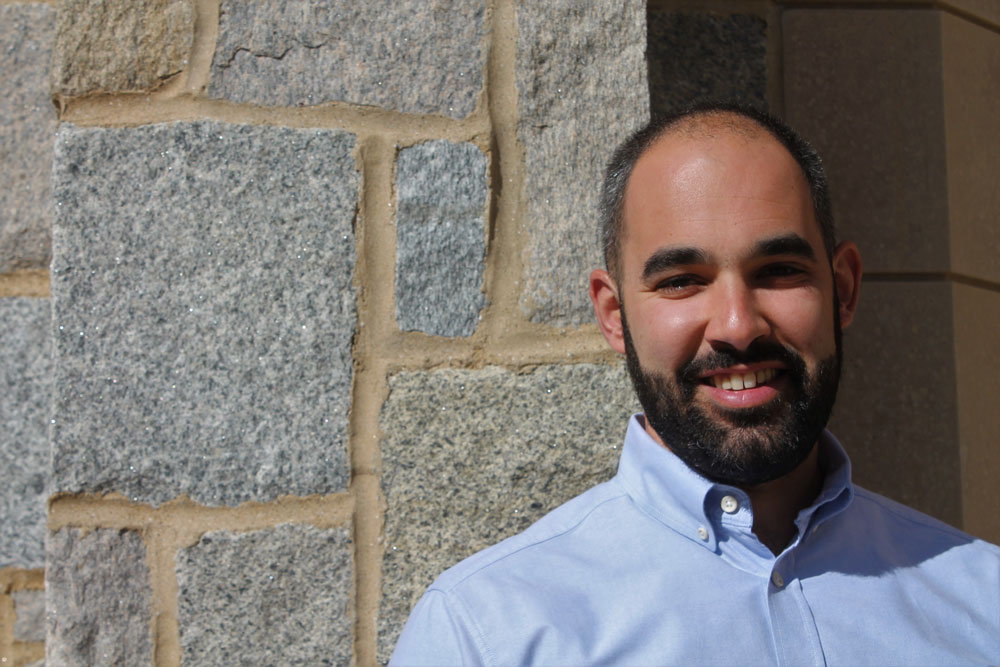
Aaron Frankel
- Degree: Juris Doctor
- School of Law
- Hometown: West Hartford, Connecticut
Why did you choose to go to law school?
My decision was based on what I learned and did while working for the governor before coming to law school. For almost seven years, I worked for Gov. Malloy in various capacities. I really enjoyed that work, especially the policy components. I got to work with a lot of lawyers in the office and I liked them a lot, and I was very interested in the work they were doing. They seemed like really creative people with a very well-defined framework for problem-solving. I felt like they had all these tools that I just didn’t have. So I wanted that framework, and I wanted to be able to do the work they were doing.
What did you accomplish during your law school experience that you’re most proud of?
I was part of the Asylum and Human Rights Clinic, and my partner and I represented a family in defensive asylum proceedings, where the government had initiated deportation and we were fighting to keep them in the U.S. We had a hearing in front of an immigration judge, and the family was granted asylum. The class was very intense and demanded a lot, and obviously it was amazing to get to work with real people and be able to actually help them. Definitely something I’ll be proud of for a while.
What do you plan to do after you graduate?
After I pass the bar – fingers crossed – I have a job at Skadden, Arps, Meagher & Flom in Boston. They’re a massive multinational firm that specializes in corporate law. I actually just learned last week that I will be in their litigation department, which is what I was hoping for. My wife and I are looking at apartments in Boston now.
How has UConn prepared you for your future career?
It’s done so much. I feel like I have gotten so many opportunities to try what I wanted since I’ve been here. I mean, I’ve been part of amazing clinics, I’ve taken part in so many competitions, I’ve met so many lawyers I’ve learned from. I even got this job at Skadden through UConn Law. Education aside, UConn has been amazing for helping me build real connections.
How has UConn shaped you as a person?
I’ve actually been thinking about this a lot, because I’m the class speaker at graduation. You hear so many horror stories about law school, and that just really hasn’t been my experience. I really felt like every step of the way I was supported. Especially early on, when it’s all so stressful and new, I just felt like there was always someone to turn to, always someone who had done it before. I really think the whole profession could benefit from this idea of mentorship. Obviously we’re competing for class rank and all that stuff, but I just don’t buy that that has to be part of our interpersonal stuff. It sounds kind of cliché, but that feeling of community care and support has really defined my time here. We can all do better and have more opportunities if we’re all helping each other be more prepared. I felt that in a very authentic way here.
If you could summarize your experience at UConn in three words, what would they be?
Rewarding. Community. Interesting. Ugh, those are cheesy. I guess it’s impossible not to be.
What advice would you give to a student just starting out?
You’re going to get better at being a student. Everyone starts out having no idea what’s going on, and the worst thing you can do is freak out about it. Everyone’s going to do it anyway, but just try to remember nobody else knows what’s going on. You will figure it out. It will get so much easier. Just hang in there.
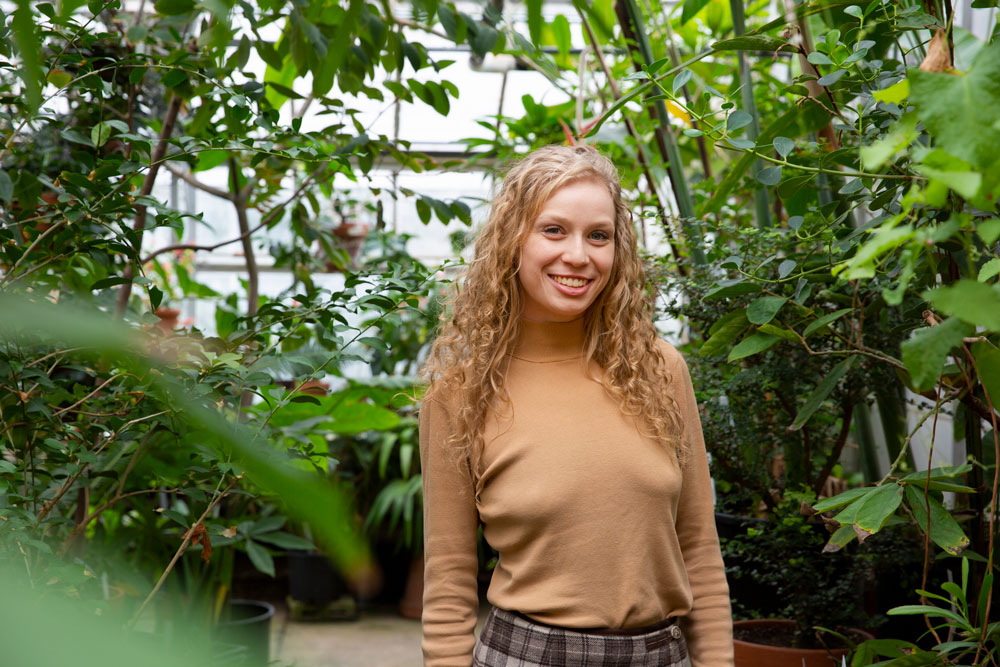
Amelia Henkel
- Majors: Double major in Physics and Human Rights, and double minor in Mathematics and Women's, Gender, and Sexuality Studies
- College of Liberal Arts and Sciences
- Extracurriculars: Women in Physics Club, president; Physics Club; Physics Peer Mentoring Program
- Scholarship: Alan B. Slifka Award
- Hometown: North Providence, Rhode Island
Why did you choose this area of study?
Physics was a natural choice because I’d always loved astronomy and the math that goes into it. I think that conceptually, it's really thought-provoking and profound to think about the bigger questions of life. And so I was just enamored with astrophysics, physics, astronomy, since I was really young. I decided to major in human rights because I thought it would be a really cool thing to study, plus I’ve always really cared about human rights. With physics you know what you're going to do in those classes, but I really didn't know what human rights would entail. I've gotten to learn that it's just truly interdisciplinary, and I could not love it more.
Have you found any connections between the majors?
There’s a ton of overlap between what physicists and human rights scholars are trying to do, even if that isn’t always reflected in practice. I’ve seen established members of the community suggest physics is the only legitimate science and all other academic endeavors are (quoting [nuclear physicist] Ernest Rutherford here) akin to stamp collecting. However, we really need to interact with other disciplines, because that’s when physics has the opportunity to make a real impact on the rest of the world. Technological advances in physics have huge implications for humanity, particularly in the developing world, and have the potential to alleviate several issues, such as barriers to clean water access.
On the other hand, respecting and promoting human rights is a prerequisite to realizing our full potential as human beings. The same can be said of women’s studies. Human rights and women’s studies hold additional importance in fields like physics, where women and non-white folk have historically been disenfranchised; in these spaces, we need to pay additional attention to what we’re doing to promote inclusion. In short, studying human rights and women's, gender, and sexuality studies while also majoring in physics makes a lot of the microaggressions and discriminatory practices in physics stand out pretty clearly, for better or for worse.
Can you describe one meaningful experience?
I loved teaching middle and high school girls this past summer at the SPARK Summer Camp. I love teaching in general. That's something that I've learned about myself at UConn. Being able to talk about all the weird and crazy things that define astronomy will always be fun to me, but being able to pull out a laser pointer or a telescope and actually show everyone what we were just talking about makes it feel so much more hands-on and real. I love being able to teach and introduce those who don't generally get to see science to really cool topics on space. It gets me excited, the same excitement I experienced when I first got into astronomy. Also, of course, I love teaching experiences like this because they challenge me to explain the same concept in a number of different ways, which helps me learn too.
Was there a time where you felt really challenged but grew as a result?
When I got a 26 on my on a midterm in one of my physics classes, and I was probably one of three girls in the class at the time. I don't think I noticed that at the time, though – the role of stereotype threat and imposter syndrome. That 26 at the time just confirmed to me that I would never, ever be able to make it. When I went to talk to my professor, I realized the exam wasn’t the end of the world. I did fine in the class – and more importantly, I found that I loved physics far too much to let one demoralizing exam convince me it wasn’t worth it.
Additional student profiles: David Dapaah-Afriyie, James Keth, Danielle Fontaine
Career Outlook 2019: Soft Skills are the Name of the Game for Employers
John and Jane are both UConn accounting students graduating this year. They’ve taken the same courses and learned from the same professors, and they’re both finalists for the same entry-level job at a large company.
John’s grades were a bit better than Jane’s, and he has a higher overall GPA. But Jane did an internship at an accounting company, where her final project involved making a presentation to the firm’s senior leadership. She was also a leader in student government, and she volunteered at a local animal shelter on the weekends.
In this hypothetical scenario, who’s the more attractive candidate?
In today’s employment market, as hiring managers place greater emphasis on the importance of so-called “soft skills,” more often than not it’s Jane who’d get the job offer.
“The one thing employers do not resonate well with is a student who may have an extremely high GPA, but has done nothing else in their time here,” says Jim Lowe, assistant vice provost and executive director of UConn’s Center for Career Development. “Twenty years ago, I will tell you, ‘I went to class and I got really good grades’ was the name of the game. It’s not the name of the game anymore.”
Our hypothetical Jane’s out-of-classroom activities help to demonstrate to potential employers her mastery of soft skills – those somewhat intangible competencies, like critical thinking, creativity, professionalism, communication, and teamwork – that are increasingly important to hiring managers. Fifty-seven percent of senior business leaders say that soft skills are more important than hard skills, according to LinkedIn Learning’s 2018 Workplace Learning Report, a survey of more than 4,000 professionals, with creativity securing the top spot as the most valued soft skill.
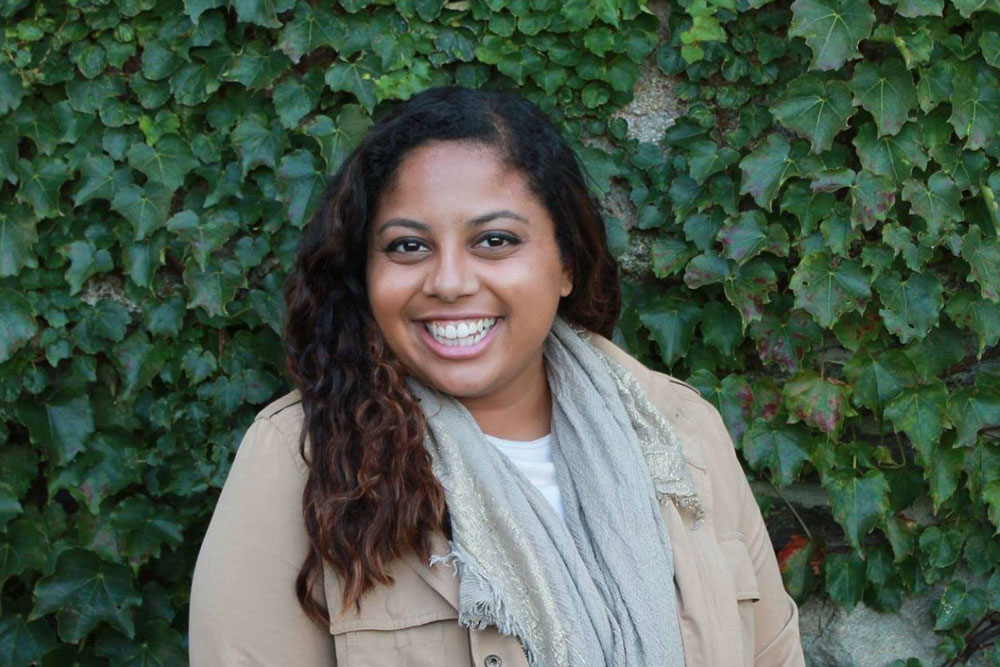
Isabella Horan
- Major: Elementary Education with a minor in English
- Neag School of Education
- Extracurriculars: Pi Beta Phi; First Year Experience Program; Teacher Education Student Association
- Hometown: Duxbury, Massachusetts
What inspired you to become a teacher?
I want to become a teacher to be the positive role model of color that I lacked in my K-12 education.
Who is your favorite professor?
My favorite professor is Dorothea Anagnostopoulos. Dorothea has been an inspiration to me throughout my career at UConn. I have been lucky to take a course with her, Multicultural Education, and also work with Dorothea on my thesis, as she is my advisor. She is inspirational, intelligent, and cares about each and every one of her students more than any professor I have seen at this university. Her multicultural class was the first time I was exposed to multicultural education, and it has changed my life for the better. I will forever be grateful that I took that course, and the knowledge that I gained will positively impact my classroom in the future.
What did you accomplish that you’re most proud of?
I am most proud of accomplishing three research studies during my time at UConn. The first research study entitled, “Diversity in the World of Education” focused on the importance of recognizing diversity within the classroom and school systems. I partnered with the Massachusetts Partnership for Diversity in Education to explore this and come up with recommendations for school systems that want to support their students of color to a greater extent in the classroom and school community. Following this, I worked with three of my peers on a research study titled, “Peer Tutoring and Translation: Mentoring for Equitable Education.” This study aimed at the development and understanding of peer tutoring programs in school systems and their benefits. Both of these research studies were funded by the UConn IDEA Grant Program. Finally, this year, I have worked to complete my honors thesis titled, “‘It’s Hard to Do Everything: Keeping Teachers of Color in the Profession.” This thesis is a case study on a beginning teacher of color, and analyzes his experiences in the profession and why he chooses to stay or considers leaving. Coming into my college education, I never anticipated being able to conduct research of my own. But thanks to the UConn IDEA Grant Program and the UConn Honors Program, I have had amazing opportunities to do research.
What do you plan to do after you graduate?
I plan to return to UConn for my master’s! However, following that, I plan to become an elementary school teacher.
How has UConn prepared you for your future career?
UConn has prepared me for my future career by giving me a holistic education. I have taken classes in various content areas, and though they have not always applied directly to my major, they have contributed positively to my intellectual abilities and understanding of the world around me. This knowledge and capability was further enhanced by my education in the Neag School of Education. In Neag, I have had endless opportunities to learn, apply, and become experienced in my major. Thanks to UConn and the Neag School of Education through the experiences, education, and support they have given me, I feel beyond ready to become an outstanding educator!
What advice would you give to a student who is just starting out?
To a student who is just starting out at UConn, I would tell them to get involved in any way they can. UConn is a large campus with a network even larger. The opportunities that can stem from your involvement and time at UConn are astonishing, impactful, and important. Whether you find the time to join a club or organization, get involved in one of the amazing research opportunities at our university, or find involvement in your major. Take the opportunities that come to you and run with them. You will get as much as you give to UConn. Do not take it for granted!
Additional student profiles: Kaitlyn Ferrara, David Dapaah-Afriyie, Konjit Richards-Johnson, Clarey Pass, Lindsey Vieweg, Danielle Fontaine, Kathrine Grant, Kimberly Duhart
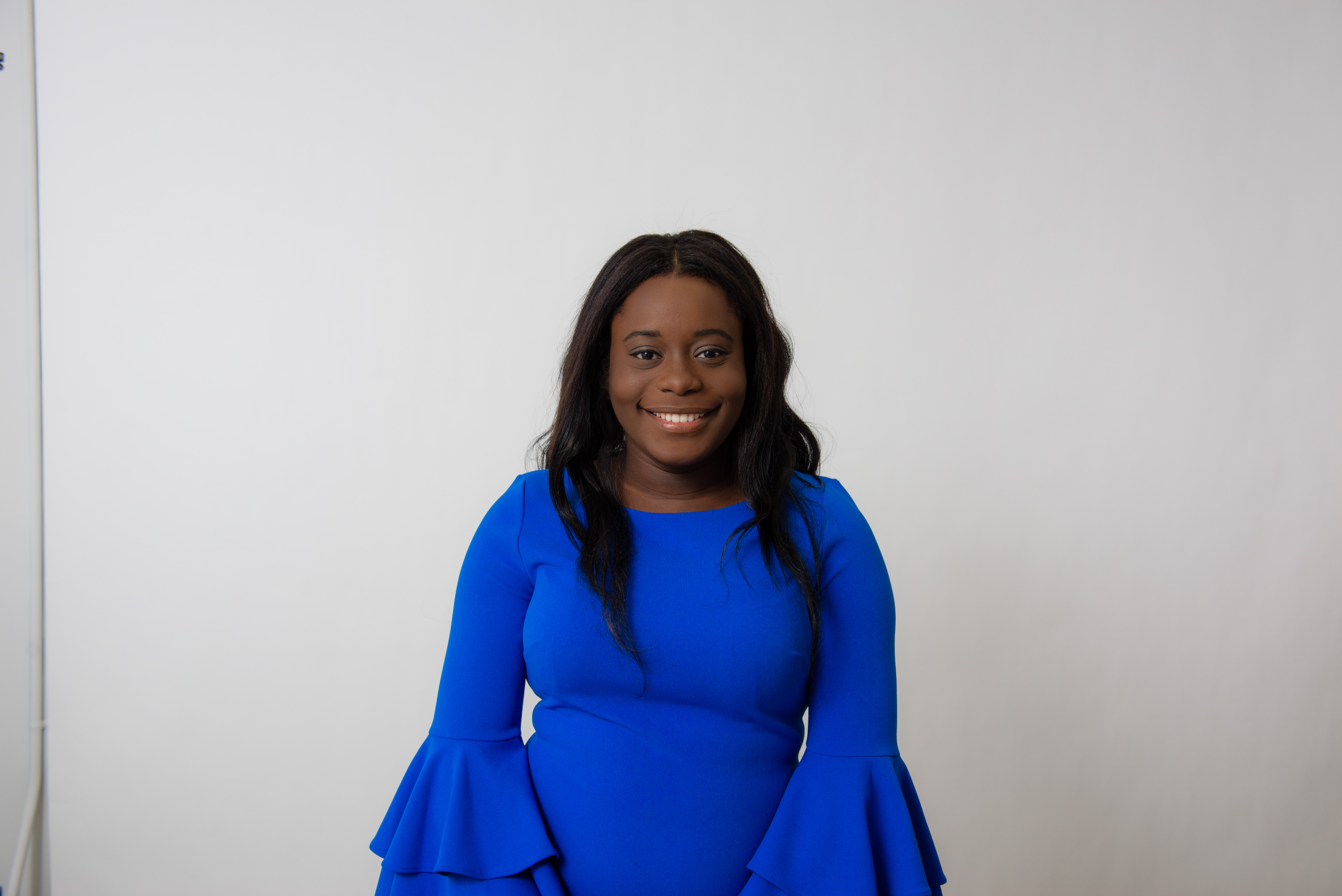
Woodlyn Joachim
- Major: Master of Public Health
- Awards: Presidential Scholar
- Hometown: Port-au-Prince, Haiti
Why did you choose this field?
Growing up in Haiti, I experienced firsthand the effects that a weak health infrastructure can have on the health and well-being of a population. This inspired me to pursue a career that would allow me to tackle this problem.
What was your favorite subject?
My favorite subjects are epidemiology and biostatistics. My first encounter with the field was during Dr. Scott Wetstone’s introductory course. His class was one of the most challenging in the program, but I learned so much. I became fascinated by the idea of being a “disease detective” by being able to identify the processes of the causes of diseases and assess the ways in which they and other conditions affect the health of the population. Most importantly, the knowledge that I gained from my epidemiology courses also allowed me to find success at work. As a research assistant at one of the largest federally qualified health centers in Connecticut, I engaged in research projects where I utilized the statistical and analysis skills that I learned in class. This made my experience at UConn a lot more rewarding.
What are you most proud of during your time at UConn Health?
As a full-time student, I also had a full-time job. At first, I found it hard to balance my school, work, and social life. However, with the help of my professors, teaching assistants, and classmates, I improved my time management skills, which allowed me to excel in my classes. This, I would say, is one of my biggest accomplishments this year.
What is your next step after graduation?
I am coming back home: to UConn Health! I have recently accepted an offer for a position at the Center for Excellence in Developmental Disabilities (UCEDD). There, I will conduct research with an excellent team. One of my long-term goals is to become a public health dentist and be part of a teaching faculty. I think dentistry is a field of medicine that is often seen as a luxury rather than a basic need to maintain one’s overall health. As such, I want to become an advocate as an educator for both my patients and future dental professionals.
How has UConn prepared you for your future career?
As a Fastrack student, UConn gave me an early start to my career development. My classes and practicum allowed me to gain the knowledge and experience needed to excel in the field.
How has UConn shaped you as a person?
Being a first-generation college graduate means a lot to me. In high school, I was not very confident in my ability to succeed in a college environment. However, UConn saw my potential by welcoming me to their institution. The endless resources that I have received as both an undergraduate and a graduate student here at UConn helped me gain the confidence needed to succeed in both my academic and professional lives. This has inspired me to one day work in academia and help others find their confidence in order to achieve their dreams and attain what they deem as success in life.
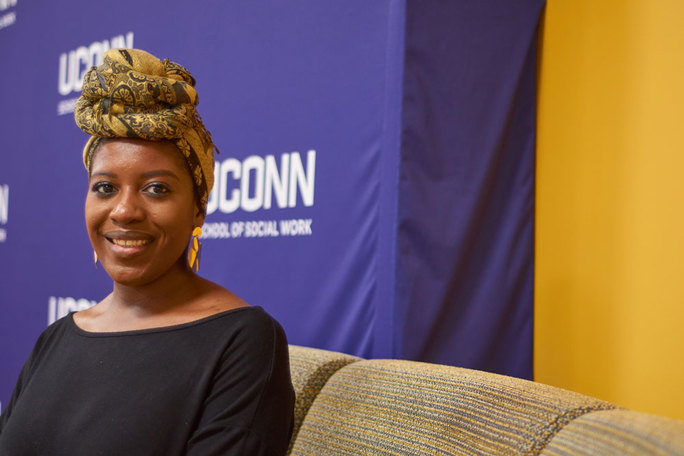
Bree'Ana R. Johnson
- Degree: Master's of Social Work Policy Practice
- School of Social Work
- Scholarships: Mary Ellen and John D. Killeen Master of Social Work Scholarship Fund (2019); Frank V. Carrollo Scholarship Fund (2018)
- Hometown: Hartford, Connecticut
Why did you choose your concentration?
Only when an experience has personally impacted us do we tend to give importance to that experience; without personal impact, an experience lacks credence and significance. Gaining that perspective allowed me to understand that people cannot be strictly defined by or held accountable for their circumstances. People, instead, need policies and advocates in place that will work to improve their lives. Through my lived experiences, the social advocacy work in which I hope to engage can be the leverage to influence systematic transformation.
What did you accomplish during your time at the School of Social Work that you are most proud of?
I have continued to be a prime advocate in and outside of the classroom, for my community as well as Black families nationwide. While delving into discussions with students of color and my advisor, I gained insight about the importance of understanding the African diaspora, along with the inequities that exist in institutional settings. This has strengthened my willingness and power to become more involved in school activities and events, as well as examining the policies that exist within, which resulted in my securing the co-chair position for the Graduate Student Organization.
What do you plan to do after you graduate?
Given my experience as a community and policy advocate with an understanding of the sociopolitical concerns of at-risk youth, I remain committed to enhancing interpersonal and team-building skills to improve programmatic practice. I aim to reduce cyclical disadvantages and support youth who have been impacted by systemic inequities and oversight.
How has UConn shaped you as a person?
As an emerging professional within the political advocacy realm, it was imperative that I gain as much insight as possible from experts in the field. I took advantage of the many opportunities the School of Social Work had to offer with much guidance from an integral member of the UConn community, who enhanced my ultimate growth and professional development. This individual provided me with a better understanding of my responsibilities as a Black female advocate.
If you could summarize your experience at the UConn School of Social Work in three words, what would they be?
My experience as a student at the UConn School of Social Work falls into three different stages.
First: eye-opening. Learning the code of ethics and roles of a social worker were influential, along with hearing the novice mentality of my classmates surrounding their narrative about the systemic oppression that exists in our society and in our institution.
Second: complex. Challenging the norms while trying to stay afloat, academically, spiritually, and professionally was an entire production.
Third: relieving. Realizing the impact that I’ve made in the School of Social Work, along with the strength that I encompass, is a brilliant feeling.
Additional student profiles: Johanna Schubert
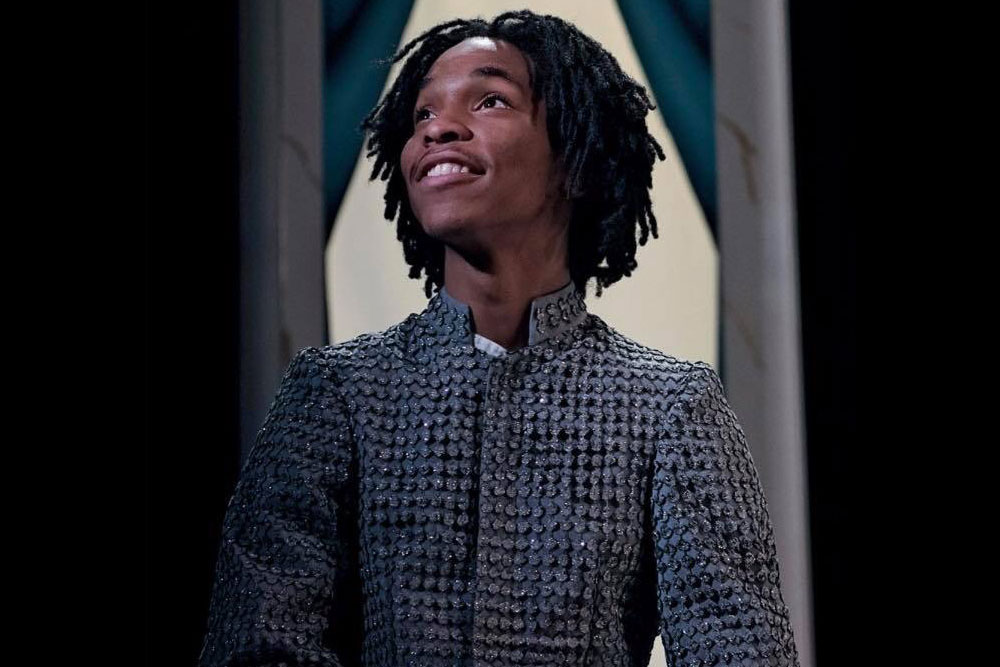
Kareem A. Mack
- Major: Music, Vocal Performance
- School of Fine Arts
- Extracurriculars: UConn’s Praise Dance Ministry, vice president; Project Fashion, member; Storrs Congregational Church, choral scholar
- Scholarships: Heilig Scholarship; School of Fine Arts Scholarship; and J. Louis von der Mehden Scholarship
- Hometown: Clinton, Maryland
Why did you choose to study vocal performance?
Singing has always been the performance medium that has taught me how to best communicate and express myself. I started singing years ago, and only became more interested in finding my true and honest voice. So I decided to study vocal performance.
Who is your favorite professor or class?
That's tough. Excluding my voice teacher, whom I love dearly, my favorite class is Opera Workshop, taught by my favorite teacher Spencer Reese. In the class, he emphasizes doing what works best for each individual. He has created a realm enabling various ways for the students to express themselves by offering a plethora of performance literature and presenting us with tools to best understand and communicate the pieces.
What did you accomplish during your college experience that you’re most proud of?
I performed a few smaller roles with the UConn Opera, but I was most grateful when I performed a lead role. I stood alongside the doctoral and master's students and balanced learning and performing this role with the challenges of being an undergraduate student. It was then that I most felt like a conqueror.
What do you plan to do after you graduate?
I aspire to continue my studies in music and vocal performance by attending graduate school. Which school is still to be determined. But I am remaining faithful and praying that God sends me down the path He sees best fit for me.
How has UConn prepared you for your future career?
UConn has taught me to be a disciplined professional by offering me many opportunities to collaborate with working professionals. UConn has also taught me to be versatile and cheerfully flexible by forcing me to balance academia with music.
How has UConn shaped you as a person?
UConn has taught me to be more patient and understanding. I have been disappointed a few times, but I was taught that my time will come. Also, UConn has taught me to be unapologetically me. There are many times I felt an urge to doubt myself, but was soon reminded that if I don’t stand for something, I will fall for anything.
If you could summarize your experience at UConn in three words, what would they be?
Pivotal. Assuring. Loving.
What advice would you give to a student just starting out?
If you’re starting at UConn, balance is what I emphasize. It’s your time to truly figure what works for you. So find yourself important enough to find balance in this tedious yet enchanting journey.
Additional student profiles: James Keth

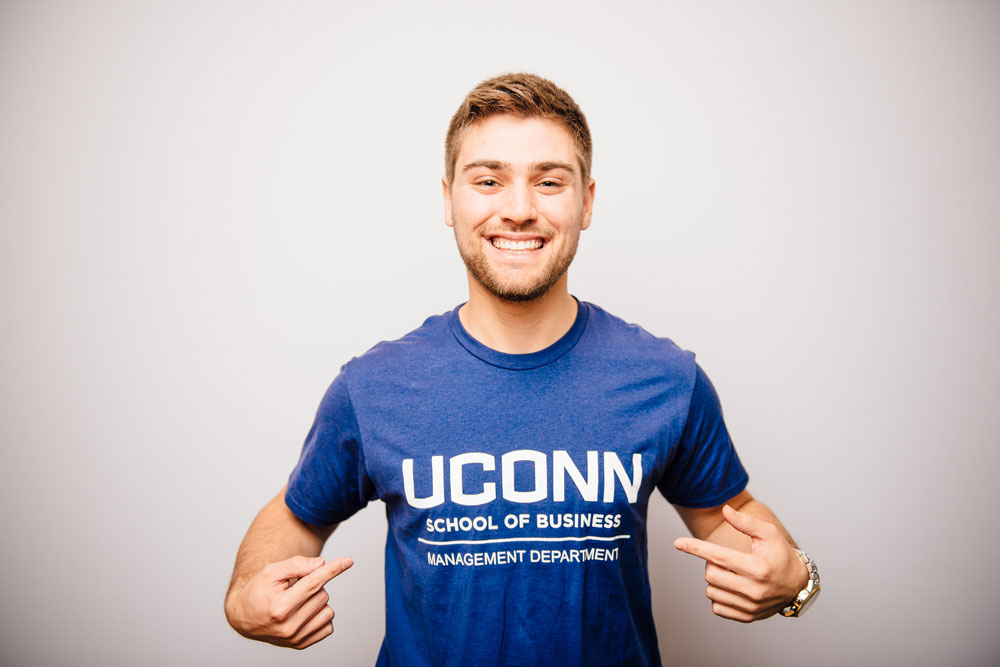
Benjamin Morneault
- Major: Management with an Entrepreneurship Concentration, with a minor in Analytics
- School of Business
- Extracurriculars: Business Management Society, president; Werth Institute, campus ambassador; Innovation Quest, campus ambassador; Management Department, campus ambassador; Roast Me, co-founder; Creating Economic Opportunity, member; Undergraduate Business School Leadership Conference, delegate
- Scholarships: University of Connecticut Presidential Scholarship; Mark E. Freitas Scholarship; Michael L. Daversa Entrepreneurial Award; Daversa Senior Entrepreneurship Award
- Hometown: Windsor, Connecticut
Why did you choose your area of study?
Growing up, I wanted to be the GM of the Los Angeles Lakers. I intended to major in sports management, but after speaking with mentors, realized I would have more flexibility and experience with a background in business. I chose management because I wanted to understand how to run a business and lead others, instead of specializing in a particular area of business. Then I found my passion for entrepreneurship and declared my concentration. As for my minor, I realized that big data was the future, and I wanted to have an understanding of data analytics before I entered the workforce full-time.
What did you accomplish during your college experience that you’re most proud of?
I was recently inducted into the School of Business Student Hall of Fame. This is my proudest accomplishment, because it recognizes my entire body of work at UConn, from academics to extracurricular activities. My hard work has paid off, and I am excited to use this honor as a stepping stone in building connections with Fortune 500 executives and seasoned entrepreneurs, and as a platform to give back to the UConn community.
What do you plan to do after you graduate?
I will be working full-time as a business analyst for Loeb Enterprises, an early-stage venture lab in New York City. I am also working with two other UConn students to commercialize "Roast Me," a social card game that lets you burn your friends. We plan to go to market and grow the business after we graduate.
How has UConn shaped you as a person?
UConn has pushed me outside of my comfort zone. When I started my freshman year, I had a shy personality and was hesitant to try new things or go out of my comfort zone. Through my time at UConn, I've been able to work on those aspects of myself – now I challenge myself to initiate conversations, try new things, and treat opportunities to go out of my comfort zone as opportunities to grow as an individual.
If you could summarize your experience at UConn in three words, what would they be?
Seize the opportunities.
What advice would you give to a student just starting out?
Make time for what's important. Remember that you are in charge of your own schedule. If an opportunity presents itself, but you have a prior commitment, ask yourself which will align to your overarching goals (your "why"). People are more understanding than you think – just be open and honest. Get to know your professors and your academic department. You never know who might know someone else, and change your entire career trajectory. You have to be in the right place at the right time, but constantly making new connections and seizing opportunities will increase your chances. Lastly, when you think about your career, reflect on what you want to remember from your time at UConn. That should be your guiding light in making decisions throughout your collegiate journey.
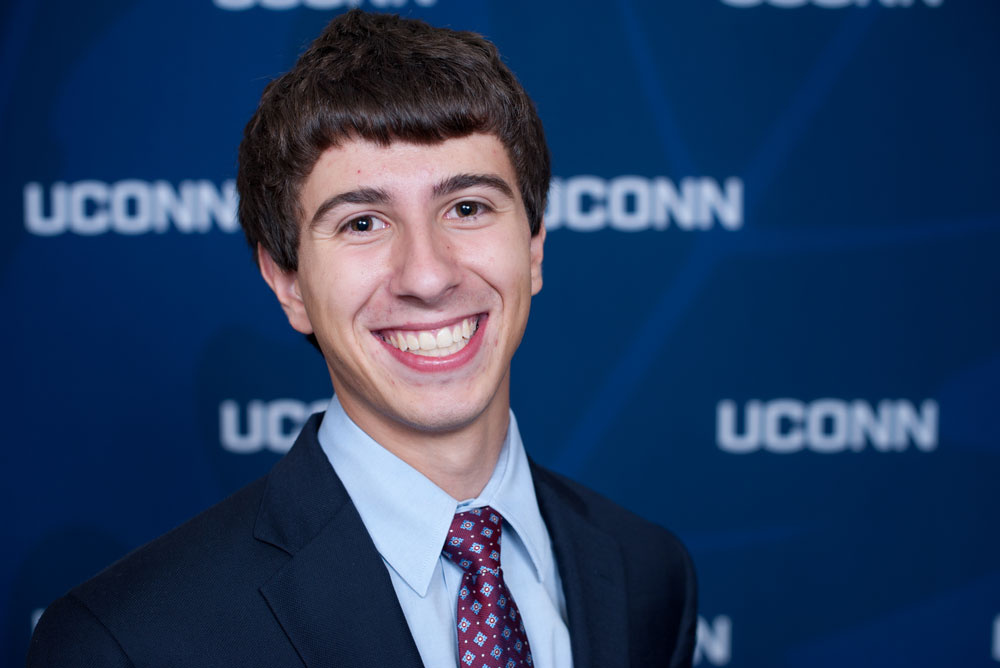
Justin Pedneault
- Major: Nursing
- School of Nursing
- Extracurriculars: UConn Rescue, president; University AED Committee; UConn Student Nurses’ Association, president; Nursing Class of 2019, class secretary; Manchester Land Conservation Trust, member of the Board of Directors; Suffield Volunteer Ambulance Association, member; St. Francis Hospital Department of Trauma, intern; Stop the Bleed, instructor; Hartford Hospital CESI, EMS assistant instructor; UConn Project Heal Chapter, member, secretary
- Scholarships: Richard and Maureen Hollfelder Memorial Nursing Scholarship
- Hometown: Manchester, Connecticut
Why did you choose your area of study?
Because of my involvement with the ambulance, starting in high school. I very quickly learned that I enjoyed taking care of injured and ill people, and I wanted to learn more so I could do more to help my patients. I knew nursing was my path because of the direct involvement in patient care and the art of nursing, showing empathy and truly caring for the patient as an individual.
What did you accomplish during your college experience that you’re most proud of?
One thing I am most proud of is my efforts in growing the UConn Rescue training program and the University Automated External Defibrillators (AED) program. Starting freshman year, I joined the UConn Rescue student organization as a training coordinator and initiated their training program from scratch. Over my college career, the program has grown to the point where we have trained over 1,300 people. Currently, we regularly offer more than 15 classes each semester. In my junior year, this led me to start thinking about adding a second AED and public access bleeding control kits within the School of Nursing. Once I started the discussion, my idea quickly turned into a university-wide initiative comprising over 135 locations, with AEDs and bleeding control kits presently deployed across all seven UConn campuses. Because of my efforts, and the UConn Fire Department’s involvement with this new program, UConn will be the first school in Connecticut to be designated by the Connecticut Department of Public Health as a HeartSafe Campus.
I see the AED program as my legacy to UConn, and if the deployed medical devices save just one person, all the time and effort I have devoted to this program was worthwhile.
What do you plan to do after you graduate?
I plan to start working as a Registered Nurse in an Intensive Care Unit at a large, level-one trauma center in the Hartford, Connecticut area. I always knew I thrived in the high acuity, fast-paced environment. All my time and experiences at UConn have confirmed that the ICU is where I am meant to be, assisting the most critical patients in their time of need – to be the best part of their worst day.
How has UConn shaped you as a person?
UConn has shaped me as a person by providing an environment and culture that allowed me to run with my ideas. Where something did not previously exist, if I had an idea to create something, I had an avenue to take my idea and make it a reality. UConn supported all of my seemingly “crazy” ideas.
If you could summarize your experience at UConn in three words, what would they be?
Inspiring. Empowering. Enriching.
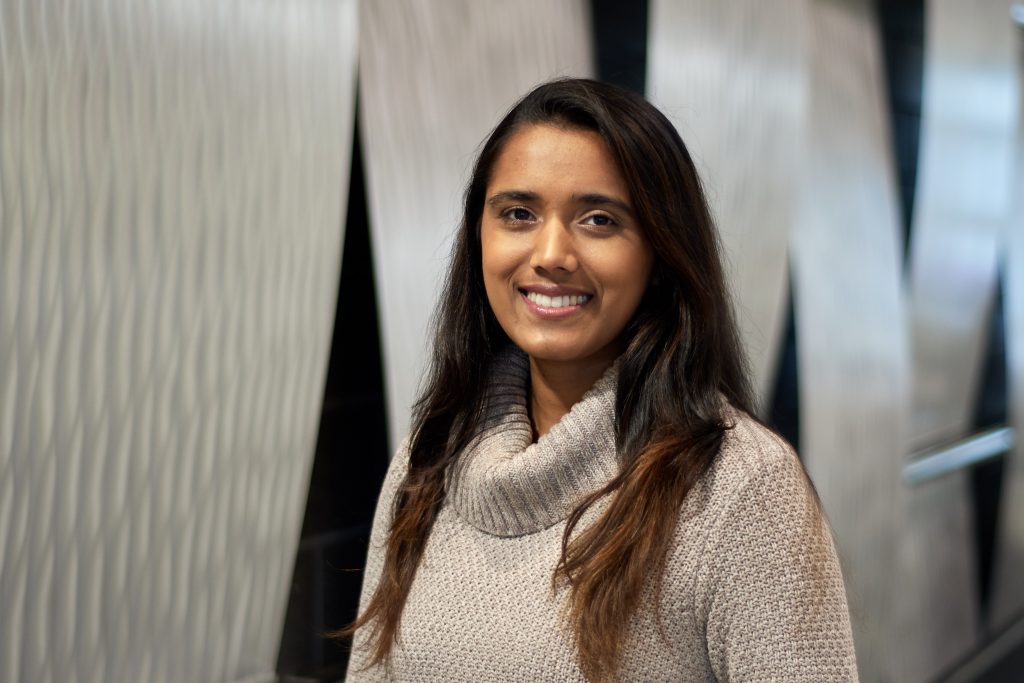
Susmitha Rayakota
- Major: Computer Science and Engineering
- School of Engineering
- Extracurriculars: Engineering Ambassadors, member and former co-president
- Hometown: Stratford, Connecticut
Why did you choose to study computer science and engineering?
I’ve always enjoyed learning how things worked. I pushed all the buttons, I "accidentally" broke a lot of TVs and remotes, and volunteered to explore all the tech I was able to get my hands on. When the time came to choose majors, I wasn’t sure what I wanted to pursue – computer science and engineering seemed to be the best fit.
What did you accomplish during your college experience that you’re most proud of?
Throughout the past four years, I came across so many things that sparked my interest. More often than not, I found myself taking action to pursue that interest. I learned something new about the activity, this university, people, this world, or just the fact that maybe it wasn’t something meant for me. My pure curiosity and eagerness to learn taught me a lot about myself, and I am proud of that.
What do you plan to do after you graduate?
I will be working as a software engineer at Lockheed Martin. However, before I begin this next chapter of my life, I plan to do some traveling and figure out how to be a kid again!
If you could summarize your experience at UConn in three words, what would they be?
Transformational, empowering, and enjoyable.
What advice would you give to a student just starting out?
There are so many experiences this university can offer you. Each and every one of them has some valuable lesson to offer, and you’ll be surprised how it could benefit you later in college. As a freshman, I would strongly encourage you to explore everything. If you see something interesting, learn more about it until you feel that you've had enough of it. Because, who knows, maybe that opportunity will lead you somewhere you’re meant to be all along.
You are heavily involved in Engineering Ambassadors. How has that experience shaped you?
Engineering Ambassadors has given me another family at UConn. The organization’s goal is to inspire the younger generations in underrepresented communities to pursue careers in STEM fields of study. I learned so much about diversity in STEM, disparity in opportunities between various demographics of people, and how much difference a short 25-minute presentation and demo can make in the future career plans of a 7-year-old. Our goal was to spark inspiration for future generations, and with that intention, I often found myself inspired by others involved in this community. Being a member and in this organization’s leadership made me who I am today, an empowered woman of color in engineering who stands to empower others by showing that if I can do it, so can they.
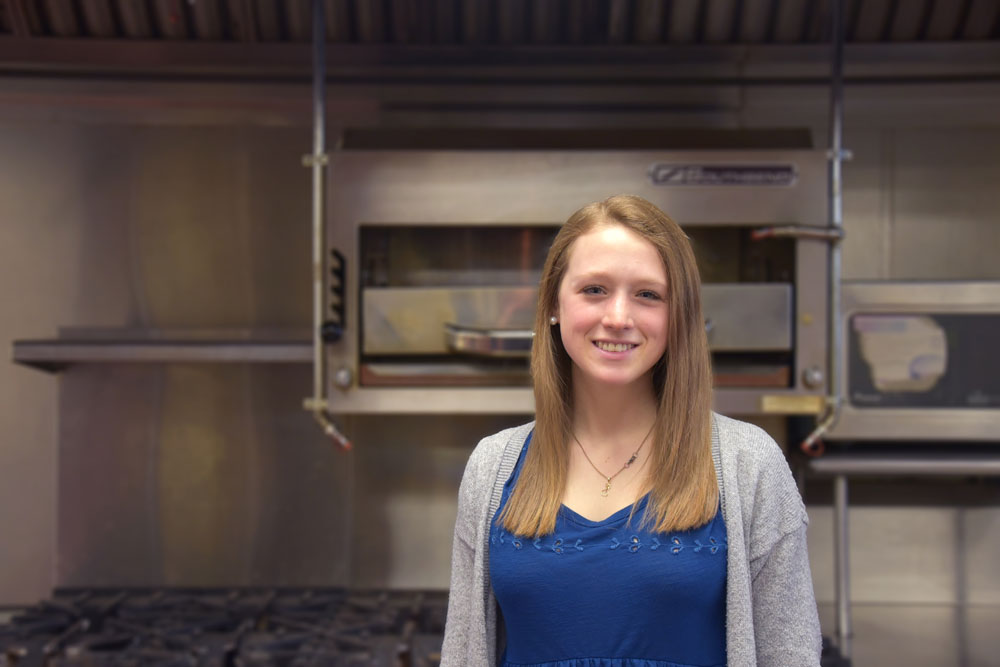
Jessica Seltz
- Major: Nutritional Sciences
- College of Agriculture, Health, and Natural Resources
- Extracurriculars: Nutrition Club, president
- Scholarships: Mary M. and Katherine E. Connelly Sister Scholarship (2016, 2017, 2018), Alan S. Farwell Scholarship (2017), Willard H. Allen Scholarship (2018), Babbidge Scholar (2016, 2017, 2018)
- Hometown: Tyngsborough, Massachusetts
Why did you choose this area of study?
Growing up in a large Italian family, food has always been central to my life, and when my aunt was diagnosed with cancer, she was able to use food as a means of regaining her energy and her health, which fascinated me. I wanted to incorporate my love for food and nutrition with my interest in science so that I could fully understand the nutrients our bodies need to keep us healthy and function, and be able to relay that information to others and help them.
What did you accomplish during your college experience that you’re most proud of?
I am most proud of all that I have accomplished as part of the Nutrition Club, particularly this past year as the club’s president. I was able to acquire funding for the club, as well as set up many new events for members, which have a positive impact on the surrounding community. One particular event we recently started is working with the Kidney Disease Awareness Club on campus to help out at their screenings and educate the local community on a diet that is both protective for kidney disease, but may also help to decrease progression of the disease as well. In addition, we also are now taking part in Earth Day, educating people on sustainability and food waste. Through events like these I feel the Nutrition Club is really getting out there and is helping the local community.
What do you plan to do after you graduate?
I hope to obtain a dietetic internship combined with a graduate program so that I can obtain a graduate degree and be able to sit for the registered dietitian exam, and eventually become an RD.
How did studying abroad impact your academics?
During the summer after my sophomore year of college, I had the opportunity of studying abroad in Florence, Italy, for the UConn Mediterranean Diet and Tuscan Cuisine program. This was an absolutely amazing experience and taught me not only more about nutrition, but also about the different cultures and customs of other countries, which gave me a much greater respect for out food and where it comes from. I would recommend anyone who can to study abroad, as it not only implements your education, but also helps you to become more aware and understanding of other cultures and lifestyles.
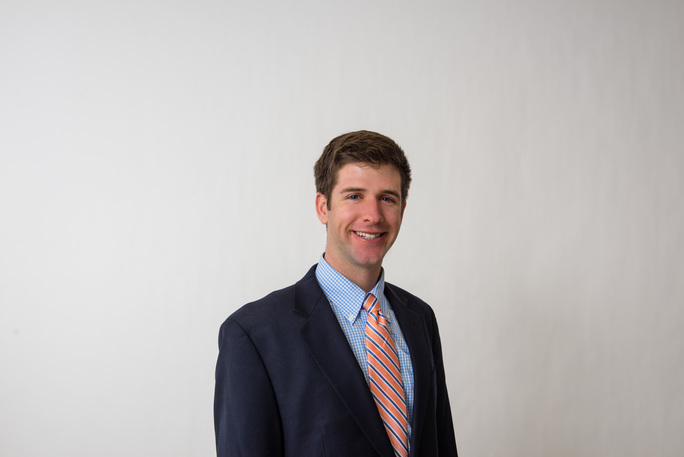
Evan Woodford
- Degree: Dental Medicine
- School of Dental Medicine
- Extracurriculars: American Student Dental Association member; UConn Foundation Alumni Board, member; South Park Dental Clinic volunteer; Phi Chi Chapter of Omicron Kappa Upsilon, member.
- Hometown: Westbrook, Connecticut
Why did you choose this field?
Although I have grown up with dentistry my whole life as both of my parents are dentists and graduates of UConn, I was relatively late to pursue it as my career choice. I believe it is one of the most rewarding professions one can pursue. It is unique in that we have the ability to positively influence people’s lives with our own hands, while also owning a practice and enjoying a great lifestyle. A person’s smile is a very intimate part of their being. It has strong impact on how they present themselves to the world. Dentistry allows us the opportunity to immediately change someone’s life for the better, whether it is a large change such as giving them a new confident smile or a small change such as coaching someone on brushing habits so they can keep their mouth healthy.
What did you accomplish during your time at UConn Health that you’re most proud of?
I have had the opportunity to work with several patients from start to finish of their care. At their presentation, they may have had lots of decaying teeth, broken fillings, or severe gum disease. I have been fortunate to be able to complete their care, to save the teeth I can, and remove the ones I cannot, to control their disease, replace fillings, and ultimately given them not only a smile but the ability to chew again. This process takes a long time in the student clinics, in some cases over a year of consistent visits. It is extremely rewarding to get to know some of these people and then help them to better their lives.
What is your next step after graduation?
I will be attending a one-year general practice residency program at Danbury Hospital before pursuing a private practice with my father.
How has UConn prepared you for your future career?
UConn places a strong emphasis on the basic biomedical sciences, as it is one of only a handful of programs across the country that integrates its first two years with the medical students. Therefore, its graduates are exceptionally well prepared not only to treat the mouth but the entire person. It is truly a comprehensive care clinic. As a health care provider, we are another point of access to get people the care they need. We are not only trained to manage medically complex patients, but also to catch other basic medical concerns that may have gone undiagnosed.
How has UConn shaped you as a person?
It was in the first two years of dental school that group studying became close to essential for success. It was immensely helpful to work with a group to talk through the complex organ systems and biochemical mechanisms, making the work much more enjoyable as well. It was through this experience that I learned of my knack for teaching others, and more so that it is something I greatly enjoy. Some of my favorite memories are working with my classmates in the gross anatomy lab, helping to identify structures.
If you could summarize your experience at UConn in three words, what would they be?
Challenging. Stimulating. Rewarding.
